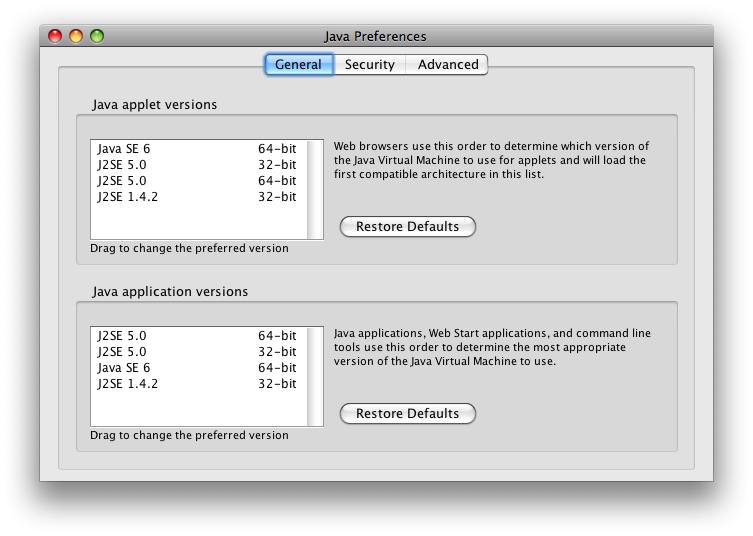
- #RECOMMENDED JAVA VERSIONS FOR MAC OS X INSTALL#
- #RECOMMENDED JAVA VERSIONS FOR MAC OS X UPDATE#
- #RECOMMENDED JAVA VERSIONS FOR MAC OS X SOFTWARE#
- #RECOMMENDED JAVA VERSIONS FOR MAC OS X PASSWORD#
This one is the easiest option for most users that like using the traditional, visual approach to computing on macOS. There are two ways that I recommend checking your Java version, and there is one procedure that I like to use to check which JDK is currently in use on my MacBook Pro.
#RECOMMENDED JAVA VERSIONS FOR MAC OS X INSTALL#
In recent versions of Java for macOS, the default install location for some files has changed and the places to look to determine your Java version, or Java JDK (“Java Development Kit” technically, now Java SE Development Kit, which stands for “Java Platform, Standard Edition Development Kit” downloads here) version, have also changed accordingly.

In these situations, and others, it is very important to be able to quickly find out your Java and JDK versions on Mac.
#RECOMMENDED JAVA VERSIONS FOR MAC OS X SOFTWARE#
dmg files) that install the software program in different ways depending on the operating system (macOS) and Java versions on your machine. When you are about to download new software on Mac, developers may have generated multiple app containers (. Open Right click on the Mac HD to ensure it has Read/Write permissions under RootĨ.Java is a class-based, object-oriented programming language that is fast and powerful and runs many important computing programs and platforms. Log off your current user and login as Rootĥ.
#RECOMMENDED JAVA VERSIONS FOR MAC OS X PASSWORD#
Enter in a root password in the Password and Verify fields.Ĥ. Click on the lock icon to unlock it, and then enter the administrator name and password. To the right of Network Account Server, click Edit. Click on the lock icon to unlock it, and then enter the administrator name and password.Į.

From the Apple menu choose System Preferences.ĭ. Enable the Mac Root User, by the following:Ī. This is because Access is a 32-bit application and Java v1.7 is only available for 64-bit applications."ģ. *Note if prompted do not use Java 1.7.x because per the Interplay ReadMe "You cannot use Java v1.7 at the system level.

Do not install the latest Java from Apple (2015-001) as this is not compatible with current Interplay releases. The Pacifist procedure of downgrading Java to 1.6.0_51 did not work because doing the java -version command from Terminal, said no java version installed. When doing the Java Version command this was the exact version#: Reference#02711561Īt java.io.UnixFileSystem.createFileExclusively(Native Method)Īt java.io.File.createNewFile(File.java:883)Īt .checkForOtherInstance(ApplicationLauncher.java:224)Īt .start(ApplicationLauncher.java:57)Īt .start(JXDKApplication.java:93)Īt .AdminMain.main(AdminMain.java:43)Īt 0(Native Method)Īt (NativeMethodAccessorImpl.java:39)Īt (DelegatingMethodAccessorImpl.java:25)Īt .invoke(Method.java:597)Īt (LaunchRunner.java:116)Īt (LaunchRunner.java:51)Īt (JavaApplicationLauncher.java:52) If using Mac OS 10.10.2 + Interplay 3.1.0 components + Java 1.6.0_65 you may get this error on launching Interplay Administrator or Access.
#RECOMMENDED JAVA VERSIONS FOR MAC OS X UPDATE#
Update as of 4/29/15 on a related instance: Using Java 1.6.0_65 worked on that system. It was resolved by upgrading to Mac OS 10.9.2, MC 6.5.4.2 and Interplay bits 2.7.5. **There was one case where downgrading Java to 1.6.0_29 did not work (for a Mac OS 10.7 system, that had 1.6.0_65).

Connect to MI HAG again, or install/launch Interplay Access When complete enter terminal and type java -version. When complete select Contents of JavaForMacOSX10.7.pkg or Contents of JavaForOSX.pkg - click Install - choose Yes to All, when asked to Overwrite/Replace - then Wait (may take longer)Ĩ.


 0 kommentar(er)
0 kommentar(er)
